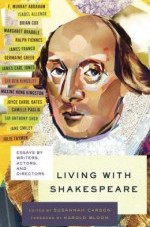Living With Shakespeare: Essays by Writers, Actors and Directors
(Vintage, April 2013)
Why Shakespeare? What explains our continued fascination with his poems and plays? In Living with Shakespeare, Susannah Carson invites forty actors, directors, scholars, and writers to reflect on why his work is still such a vital part of our culture. We hear from James Earl Jones on reclaiming Othello as a tragic hero, Julie Taymor on turning Prospero into Prospera,Camille Paglia on teaching the plays to actors, F. Murray Abraham on gaining an audience’s sympathy for Shylock, Sir Ben Kingsley on communicating Shakespeare’s ideas through performance, Germaine Greer on the playwright’s home life, Dame Harriet Walter on the complexity of his heroines, Brian Cox on social conflict in his time and ours, Jane Smiley on transposing King Lear to Iowa in A Thousand Acres, and Sir Antony Sher on feeling at home in Shakespeare’s language. Together these essays provide a fresh appreciation of Shakespeare’s works as a living legacy to be read, seen, performed, adapted, revised, wrestled with, and embraced by creative professionals and lay enthusiasts alike.
Praise for Living With Shakespeare
“An eclectic collection of pieces from an eclectic collection of writers about reading, directing, performing and adoring the Bard of Avon. The included writers agree on a few things, including the dreadful experiences they had with Shakespeare in secondary school—although Margaret Drabble felt quite the opposite; an amusing alliterative example from comic-book artist Conor McCreery: ‘I was taught that Shakespeare should scare the shit out of me.’ Another bright thread in the weave of all the essays: an enduring affection for Shakespeare. Poet J.D. McClatchy calls him ‘the language’s premier poet.’ Some contributors focus on individual plays. James Earl Jones has a long piece about his journeys with Othello; F. Murray Abraham writes about the complexities of Shylock; Eve Best compares Beatrice and Benedick with tennis legends Borg and McEnroe; Jane Smiley remembers how King Lear inspired A Thousand Acres; Joyce Carol Oates waxes academic about Antony and Cleopatra; Julie Taymor explains why she decided to cast Helen Mirren as ‘Prospera’ in her film of The Tempest. Virtually all of the writers are generous to others in the Shakespeare world, although Jess Winfield has some unhappy words for Kenneth Branagh’s film of Hamlet. A couple of writers talk about the wonders of producing and performing Shakespeare at the reconstructed Globe in London, while others defend the late ‘problem’ play Cymbeline. Maxine Hong Kingston recalls teaching Romeo and Juliet to adolescents. The least engaging essays tend to be those written by academics; the most, by those who have a passion for performance and a love of the language. Other contributors include Camille Paglia, Isabelle Allende and James Franco. Bardolaters, thespians, logophiles and followers of the muses Thalia and Melpomene—all will find light and warmth, comfort and companionship in these glowing pages.”
–Kirkus Reviews
“This collection is a must for anyone interested in reading, acting, or directing Shakespeare. A good selection for most libraries. Enthusiastically recommended.”
–Library Journal
“A cornucopia of delights for lovers of the Bard.”
–Booklist
“A consistently stimulating read, which goes a great way toward illuminating the degree to which we all live already—and can live even further—with Shakespeare.”
–Publishers Weekly
Listed on Publisher’s Weekly as one of the Best New books of the Week (April 8, 2013)
Read more on Living with Shakespeare’s official website.
Susannah Carson is an American author, editor, and academic. She received her Ph.D. from Yale, after earning graduate degrees at Paris III, La Sorbonne-Nouvelle and Lyon II, L’Université des Lumières. Her first edited volume of literary essays was A Truth Universally Acknowledged: 33 Great Authors on Why We Read Jane Austen. Her work has appeared in scholarly publications, newspapers, and magazines.

